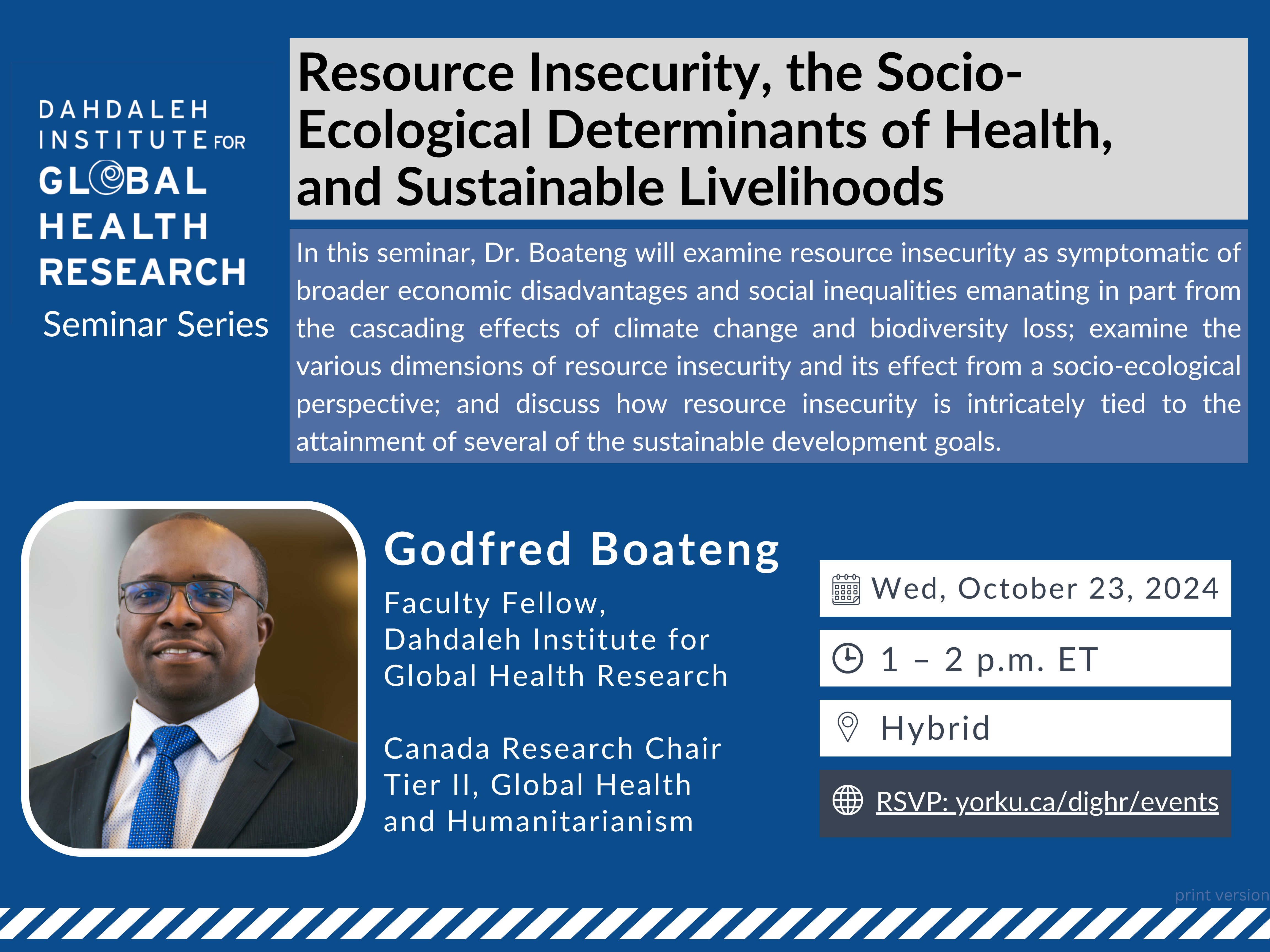Resource Insecurity, the Socio-Ecological Determinants of Health, and Sustainable Livelihoods, with Godfred Boateng
The unprecedented effects of human activities on the planet’s biophysical system have destabilized the earth’s climate, leading to warming and more extreme temperatures at local scales, more severe drought and flooding, rising sea levels, oceans becoming more acidic, plummeting biodiversity, pervasive changes in land use and land cover, and an overloading of the atmosphere with greenhouse gases. These global environmental changes (GECs) have become critical determinants of health. They affect the most vulnerable populations, particularly in low- and middle-income countries (LMICs), and the most vulnerable sub-groups, such as women, infants, children, and older adults. Effects such as resource insecurity, greater poverty, and deprivation, the spread of new and recurring infectious diseases, non-communicable diseases, and poor health outcomes create an existential humanitarian crisis calling for a more anticipatory approach to humanitarian action.
Drawing from research across multiple countries in sub-Saharan Africa, this seminar will:
- examine resource insecurity as symptomatic of broader economic disadvantages and social inequalities emanating in part from the cascading effects of climate change and biodiversity loss;
- examine the various dimensions of resource insecurity and its effect from a socio-ecological perspective; and
- discuss how resource insecurity is intricately tied to the attainment of several of the sustainable development goals.
In preparation for this seminar, Dr. Boateng has recommended reading Resource insecurity and gendered
inequalities in health: A challenge to sustainable livelihood.

Speaker Profile
Dr. Godfred Boateng is a Canada Research Chair in Global Health and Humanitarianism, an Assistant Professor of Global Health, a Director of the Global and Environmental Health Lab, and a Faculty Fellow at the Dahdaleh Institute for Global Health Research at York University. Dr. Boateng is an expert in designing and applying culturally relevant scalable methodologies to understand the multidimensional factors and processes that shape health and health equity across spatial scales (household, community, institutional, national) and how these factors can be addressed sustainably. His research program is transdisciplinary and focuses on resource insecurity, health, and sustainable livelihoods; the socio-ecological determinants of cardiometabolic conditions in aging adults; social inequity in health systems; quantitative data analysis methods and survey scale development; and COVID-19-related health effects.
Dr. Boateng’s research is supported through external funding sources including the Social Sciences and Humanities Research Council, Canadian Institutes of Health Research, Canadian Foundation for Innovation, International Development Research Centre, Eunice Kennedy Shriver National Institute of Child Health and Human Development, National Institute on Minority Health and Health Disparities, United States Health Resources & Service Administration, the National Institute of Transportation and Communities, and the Dahdaleh Institute for Global Health Research. Dr. Boateng is the Lead Associate Editor for a special issue on Measuring Health Inequalities among Vulnerable Populations in the International Journal of Environmental Research and Public Health. Prior to joining York University, he worked as an Assistant Professor at the University of Texas at Arlington and a Postdoctoral Fellow at Harvard, Northwestern, and Cornell University.
Register below and join us on Wednesday, October 23, at 1 p.m. ET
RSVP
Registration for this event has closed.

